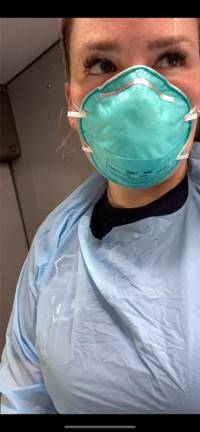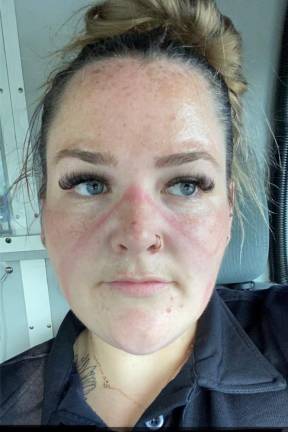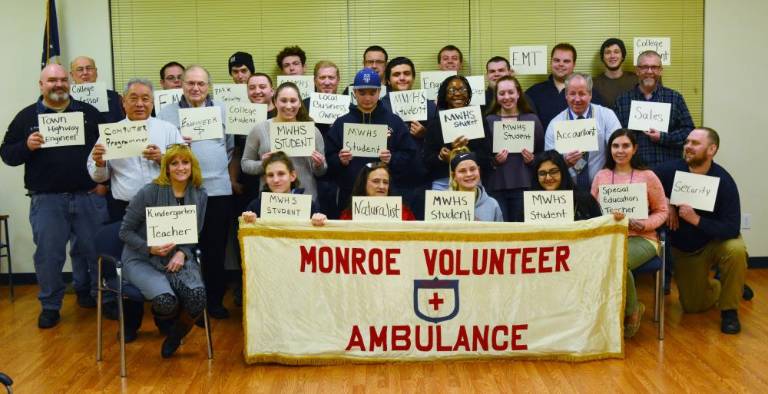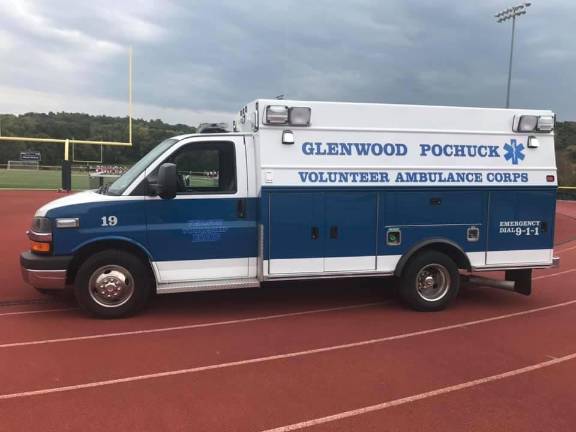Meet the people at the front of the front lines
First responders. Often overlooked, our emergency medical service workers, many of whom are unpaid and juggling full-time jobs, families, and school, just want to help their community.




Meaghan Irwin was on her commute home from St. Clare's Hospital, where she works full time as an EMT.
“Tonight, when I get back from work, I’m going to Pike County to volunteer,” she said.
Irwin, a Milford, Pa., resident, spends 36 hours a week at St. Clare’s in Denville, N.J., then dedicates another 20 to 30 hours volunteering for Delaware Township Emergency Medical Services in Dingmans Ferry, Pa. During what little spare time she has, she’s taking classes to become a paramedic.
“Due to Covid and everything, I actually kind of put my life on hold,” she said. “I want to help the community more. I’ve always been the type of person who wants to help, and right now a lot of people actually do need our help.
“So I'm like, ‘All right, let me move forward and truck through this and help as many people as I can while everything is on hold.’”
Her story is a familiar one.
“All of our members have paying jobs, and families, and other obligations, and yet they make the time to donate their time and talent to their community,” said Nancy Peifer, president of Monroe Volunteer Ambulance (MOVAC) in Monroe, N.Y.
Facing the unknown
In a typical shift, EMTs could be responding to anything: broken bones, stomach bugs, cardiac arrest.
“A typical day? You never really know. Every day I go to work and I never know what I’m going to do, which is why I like this job. It’s always different,” said Melissa P., an EMT for the ambulance corps in Goshen, N.Y., and Wallkill, N.Y.
But this year, there’s a new layer of unknown added to each call.
“The reason we refer to ourselves as ‘the front of the front lines’ is we’re going into homes, we’re climbing into your car with you, we’re going into an environment where sometimes the whole family is sick,” said Peifer. “And that can be daunting. You don’t always know what you’re going into – especially now.”
MOVAC vice president Wayne Chan said many volunteers are stressed about potentially spreading Covid to at-risk family members. “They’re taking the calls, but reluctantly,” said Chan.
“That’s my only fear now — am I asymptomatic and bringing this home?” added Irwin.
For nearly ten months she has been leaving her boots outside, changing into a fresh pair of clothing in the laundry room, and going straight upstairs to shower at the end of each shift, avoiding contact with her family until she’s completed the routine.
“I get a lot of Covid calls out in New Jersey and in Pennsylvania as well, so I don't know if I have it or not,” she said. “I take all of the necessary precautions and more, but I kind of just eliminated myself from going out into the public and distanced myself socially as well.”
This year, working in EMS has been more intense than ever. There are new pandemic-related protocols and training requirements, engagement with potentially Covid-positive patients, and a pattern of high-stakes calls to those who wait until the last minute to contact emergency services.
Throughout the spring, Peifer said, MOVAC saw fewer calls, but they were significantly more severe.
Irwin is still seeing this happen. Just last week she had a patient who was hysterical over going to the hospital because she didn’t want to be exposed to Covid.
“I have to explain until I’m blue in the face: if you feel like you need to see a doctor, don’t wait, because you’re going to need so much more care than you did a week ago,” said Irwin. “You have more of a risk of going to Wal-Mart and getting sick than you do going to a hospital and getting sick.”
A thankless job
While both of her positions are paid, and she likes her job, Melissa P. said being an EMT isn’t sustainable over the long-term. On top of her already stacked schedule, she’s studying criminal justice at SUNY Orange.
Even while logging more than 60 hours a week between the two stations, she said, “it’s just paycheck to paycheck.”
She has friends in the healthcare industry who received hazard pay and bonuses during the pandemic.
“I deal with Covid patients all the time,” she said. “I’m in the back of an ambulance with them in a confined space every day and you know what I get? A pat on the back.”
For Melissa P., hearing patients occasionally express gratitude for her work is the highlight of her job. It’s even moved her to tears.
“EMS is a very thankless job,” she said.
Many don’t get paid for their round-the-clock shifts. Irwin volunteers all of her time at Delaware Township EMS. MOVAC, in Monroe N.Y., and Glenwood Pochuck Volunteer Ambulance Corps in Vernon, N.J., are both volunteer-run.
“They don’t reap any benefits except for the joy of helping somebody,” said Kevin Duffy, chief operations officer of Glenwood Pochuck Volunteer Ambulance Corps. “And I know that sounds cliché, but I really think it’s their mindset of making sure they are part of a community. You get a lot of self-satisfaction from helping people in their worst moment. When someone calls 911, that is their worst moment possible.”
By year’s end, Glenwood Pochuck’s team is slated to complete well over 27,000 hours volunteering. They also did more than 200 birthday drive-bys for local children during quarantine in March and April.
“We are not EMS, we are not EMTs, we are not paramedics, we are not first aiders,” said Duffy. “Who we are? We are the community. We’re here for one another. We’re here to help.”
Editor’s note: This article has been revised from the original.
“Due to Covid and everything, I actually kind of put my life on hold. I want to help the community more. I’ve always been the type of person who wants to help, and right now a lot of people actually do need our help.” Meaghan Irwin, Delaware Township Emergency Medical Services
“We’re climbing into your car with you, we’re going into an environment where sometimes the whole family is sick. That can be daunting. You don’t always know what you’re going into.” Nancy Peifer, Monroe Volunteer Ambulance
“We are not EMS, we are not EMTs, we are not paramedics, we are not first aiders. Who we are? We are the community. We’re here for one another. We’re here to help.” Kevin Duffy, Glenwood Pochuck Volunteer Ambulance Corps